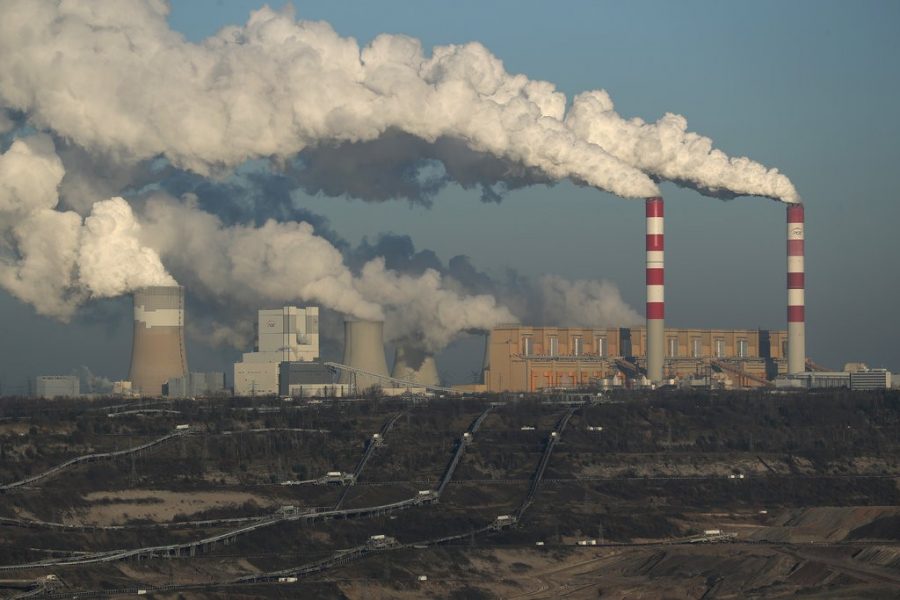We must heed climate change predictions
Courtesy of Sean Gallup/Getty Images, as reprinted in The New York Times
Gas emissions are increasing even after the Paris Climate Agreement and are not likely to stop without radical change, according to the NCA4 report.
On Nov. 23,the United States Global Change Research Program (USGCRP), a team of 13 federal agencies released Volume II of the Fourth National Assessment (NCA4). The report was a collaboration of 1,000 people including 300 leading scientists. The first volume was released last November.
The report lays out a detailed assessment of how regions of the United States are already being affected and will be in the near future by climate change. As well as the NCA4 report, the Intergovernmental Panel on Climate Change (IPCC) was requested by the United Nations Framework Convention on Climate Change (UNFCCC), after the Paris Climate Agreement in 2016, to write a special report (SR1.5) about the impact of global warming temperature rise of 1.5°C (2.7°F). The findings in SR1.5 will be talked about at the United Nations Climate Change Conference (COP24) in Katowice, Poland over the next two weeks, with almost 200 nations attending to find a solution to climate change.
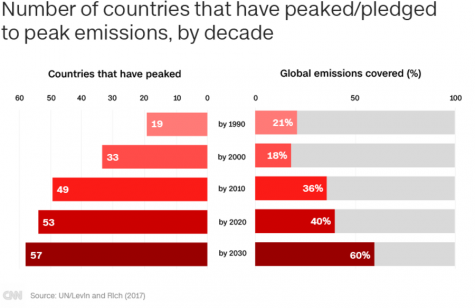
There would have to be an unprecedented global initiative to fight against climate change and reduce gas emissions. However, this is unlikely to happen if the US government continues to deny global warming.
The conference is being held under ominous news as the past four years have been the hottest on record and global emissions are on the rise again, causing climate change proponents to ramp up their pleas for change. The total annual greenhouse gas (GHG) emissions reached a record level in 2017. According to the UN Emissions Gas Report 2018, “global greenhouse gas emissions show no signs of peaking…while there has been steady progress in the number of countries that have peaked their GHG emissions or have pledged to do so in the future, the 49 countries that have so far done so, and the 36 percent share of global emissions they represent, is not large enough to enable the world’s emissions to peak in the near term.”
At the beginning of the COP24 conference The World Bank is pledging to invest $200 billion from 2021-2025. Patagonia CEO Rose Marcario on Nov. 28 announced that the company will donate $10 million it saved from recent tax cuts to environmental programs that are fighting climate change.
With all of this evidence from scientist after scientist, why do people still deny that climate change is a real thing?
“I think people tend to use scientific knowledge to reinforce beliefs that have already been shaped by their worldview. The Internet has made information more accessible to a lot more people, which is a good thing,” said Junior Gabbie Chang, ecology club public relations chair. “However, it’s made it easier to live in a ‘bubble’ that lets in only the information that you already agree with. So those who don’t believe in climate change will always be too stubborn to change their beliefs and vice versa.”
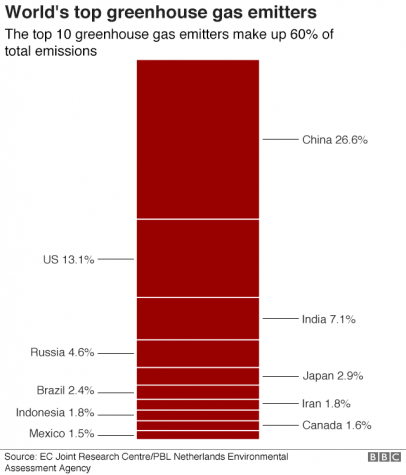
The U.S. is one of the biggest greenhouse gas emitters due to high industrialization.
Whether you agree or disagree that these reports are being too dramatic, we the people of the United States, one of the two countries leading the world in gas emissions, must admit there is a problem. Since when has it been acceptable to ignore the facts? The fact is that climate change is a very real threat and if we don’t do anything soon and make drastic decisions with our legislation to slow down climate change, then we will face the consequences.
Many people deny climate change because you can’t see C02 or any of the deadly gases that are reducing our ozone layer.
“It is the perfect problem to deny,” said Mr. Eric Jensen, biology and AP environmental science teacher. “Its an odorless, colorless silent gas that we all emit ourselves; 80 percent of the world’s energy emits. It’s an incredibly hard problem to tackle psychologically because it’s not an imminent danger.”
However, that’s just lazy. Humans have always been afraid of things they can’t see or don’t understand and climate change is one of those things. People believe that climate change won’t actually affect us, that it will only affect other nations and that the U.S. is indestructible. Climate change is a real threat and we are already seeing its effects because of people’s lack of action.
“Ecology club is doing a bunch of things to try and reduce Hinsdale Central’s footprint. In the past few years we’ve been doing more to reduce waste and conserve water,” Chang said. “Last year we got a compost bin for the teacher’s lounge (program is in the works), we tend the garden in the spring, and take care of the rain bin outside. We’re currently working on replacing all plastic straws in the cafeteria with paper ones.”
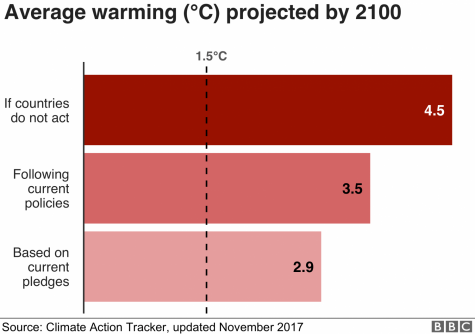
According to SR1.5, over the next century if the world were to get 1.5°C (2.7°F) hotter disastrous consequences would occur.
Some of the key predictions in the NCA4 report are that crop production will decline across the U.S., both the quality and quantity, due to warmer temperatures. Droughts and floods will become more common as the planet grows warmer. The U.S. is already seeing droughts, including having California in a state of emergency in 2014 due to the severity of their droughts. Northern California is currently dealing with the state’s largest-ever fire, that began because the vegetation was so dry that anything with a spark could’ve started the fires. Australia’s wheat production forecast is predicting an 11 percent cut, the smallest crop production in a decade, amid a devastating drought across the east coast of Australia. Australia is the world’s fourth biggest supplier of wheat.
Food and waterborne illnesses are predicted to spread as droughts and heavy flooding become more prevalent. Just today 5.1 million pounds of beef were recalled due to an outbreak of salmonella that has caused 246 people in 25 states to be sick according to the US Centers for Disease Control and Prevention.
Over the summer I went to Ireland. I was expecting it to rain, as is the stereotype of Ireland and the United Kingdom. However it rarely rained, the only time was when we were on the West Coast at the Cliffs of Moher. Throughout the trip, my family and I were baffled and confused why there was no rain. Eventually, we asked our cab driver and he told us that Ireland was dealing with a horrible drought, one that had been going on for the whole summer and was killing all the lush green iconic to Ireland. We heard this story over and over throughout our trip– the one thing that stayed consistent in our talks with locals was that Ireland was dealing with a drought and that many people were angry nothing was being done about climate change to stop it.
The excuse that even if I do something, like install solar panels onto my roof or carpool more often, will not stop climate change is not acceptable. Doing something about climate change is better than doing nothing, at least we can say that we tried to slow it down rather than rolling over and letting climate change run its course. We, as Americans, must do something as our government clearly doesn’t believe in climate change.
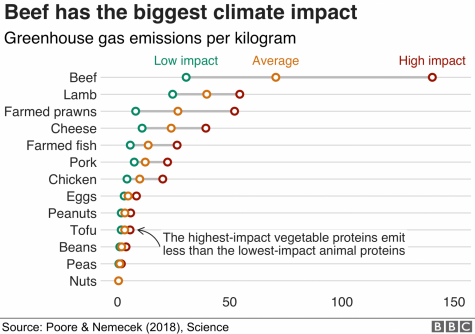
Cows produce massive amounts of methane that is contributing to global warming.
“Anything that we build here can be built so intelligently and [so it] almost doesn’t use energy. We need to redesign how we heat homes from heat furnaces to heat pump systems,” Jensen said. “The biggest contributor to climate change is I think methane and [the] agricultural sector; there are 1.5 billion cows on this planet that spew out 70 liters of methane a day themselves so de-emphasizing a red meat-intensive lifestyle is something anybody can do.”
Former EPA Administrator Scott Pruitt denied that carbon dioxide played a key role in driving climate change, even saying:
Brutal and Extended Cold Blast could shatter ALL RECORDS – Whatever happened to Global Warming?
— Donald J. Trump (@realDonaldTrump) November 22, 2018
Current acting administrator and predicted to be named head of EPA, Andrew Wheeler, is also a denier of climate. If the heads of the EPA, an agency meant to help our environment don’t believe in climate change, something that is and will kill our environment, we can’t rely on the government to fight climate change.
The NCA4 report also makes predictions about damage to our ocean life. It predicts a 46 percent loss of oyster harvests in the Southeast by the end of the century as a worst-case scenario. The oyster, shrimp and crab industries may lose $230 million as seafood will die because of ocean acidification. Ocean reefs in the Florida Keys and the Great Barrier Reef are already disappearing as the oceans warm.
The cost of doing nothing.
Annual economic losses in the USA due to climate change in 2090 according to the 4th National Climate Assessment (in 2015 $):
Moderate warming (RCP 4.5): $280 billion/yr
Extreme warming (RCP 8.5): $500 billion/yr#ClimateFriday #NCA4 pic.twitter.com/ncMj2vGDLS— Robert Rohde (@RARohde) November 23, 2018
Extreme weather and temperatures may have serious consequences on our mental health, leading to more PTSD, anxiety, and depression. Those exposed to extreme heat are more likely to be aggressive, violent and suicidal. The hotter it is the more uncomfortable it will be for people, causing annoyance. As our air quality worsens people won’t be able to spend as much time outside which will increase stress levels.
Alongside decreasing mental health more people will die. Poor air quality can lead to more strokes and heart attacks. The increasing heat will pose a danger for the elderly with increases of the death rate by 2.8 to 4 percent with each increase of approximately 1.8 degrees Fahrenheit. The Midwest alone, which is predicted to have the largest increase in extreme temperatures, will see an additional 2,000 premature deaths per year by 2090. In Chicago, it will make working outside a lot harder when 100-degree days become increasingly more common. By the late century, the report predicts that Chicago could see almost 60 days a year over 100-degrees, making it more like present-day Phoenix or Las Vegas.
The rare days when the temperature is 100-degrees is unbearable; I don’t even like going outside when it’s in the nineties. In the summer I have no motivation to go outside when it’s so hot so to picture a time when we will have potentially 60 of those days is shocking.
I could go on and on to explain what the report is predicting will happen to us within this century. However, the fact of the matter is that if we ignore these facts, not only will we and future generations pay the price, so will our planet.

Lia Reichmann, senior, is well versed in anything to do with Friends, Harry Potter, and sports. She likes to go backpacking and taking photos (follow @liareichmann_photography...



